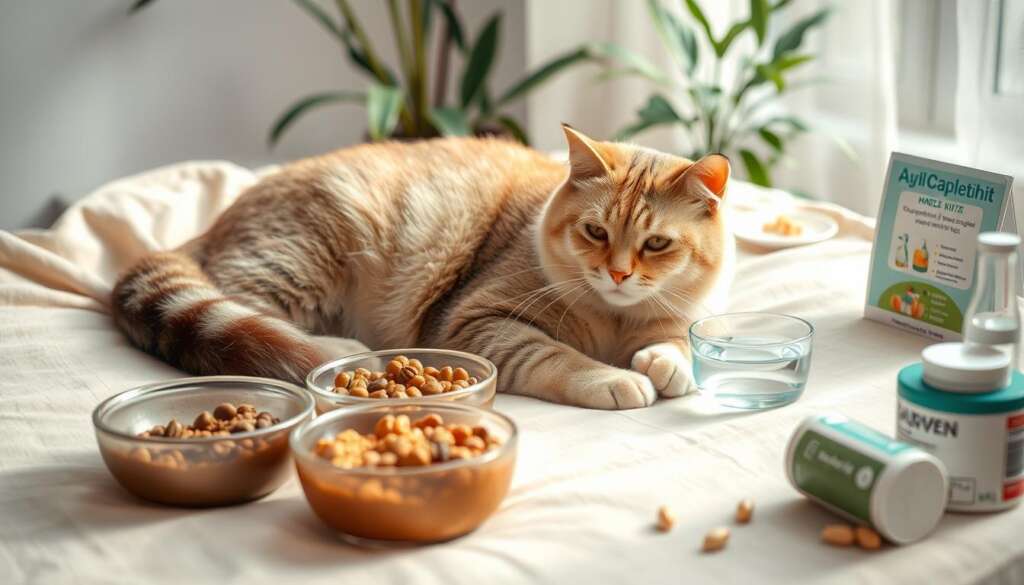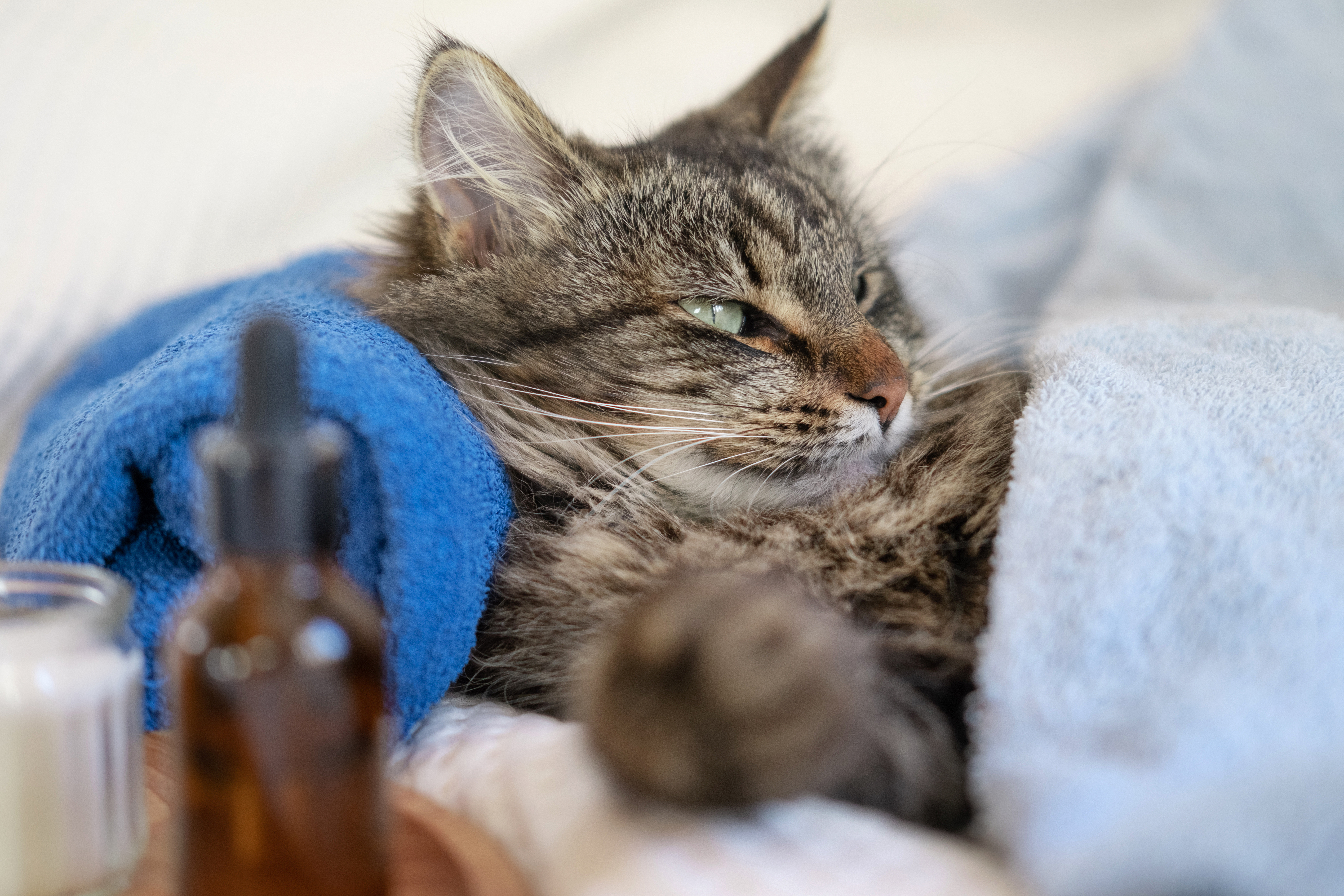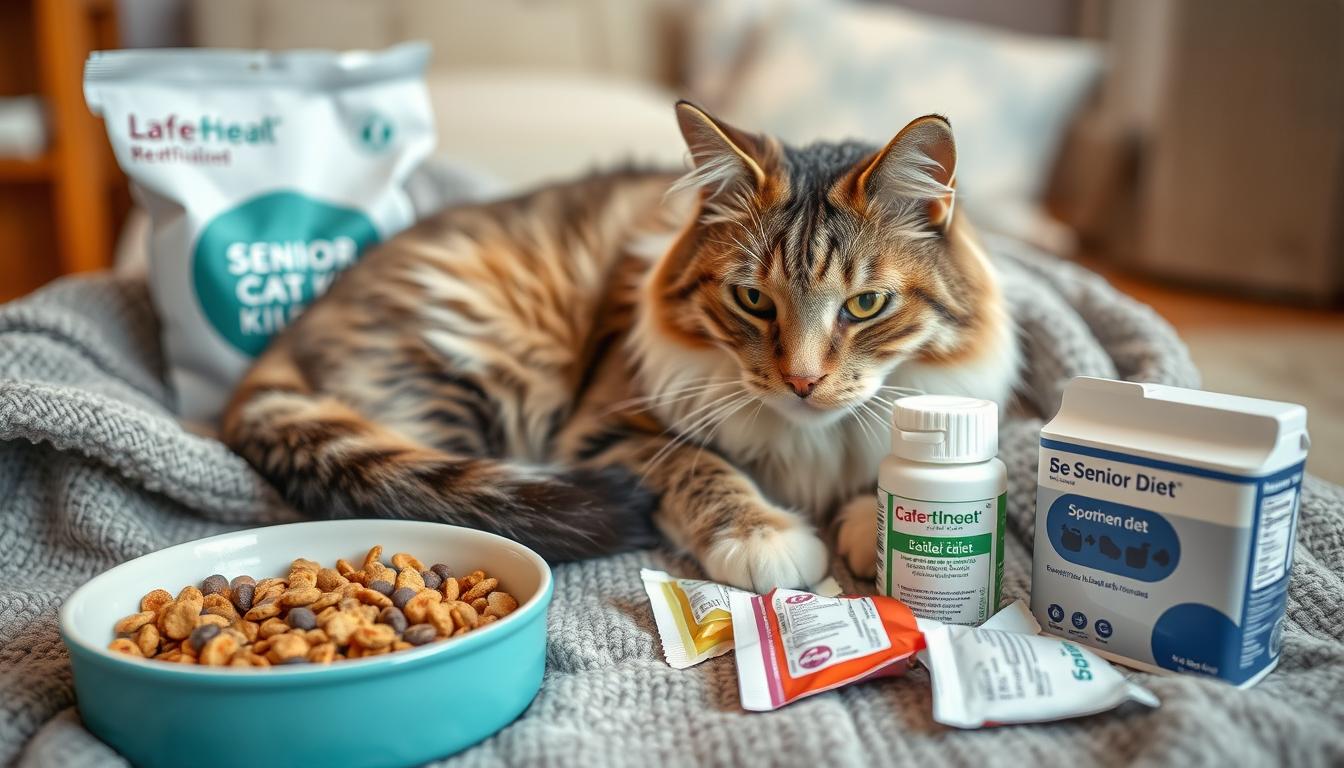Share This Article
As our feline friends age, they often hide signs of aging well. But, did you know an estimated 1 in 3 cats will develop kidney disease in their lifetime? This shows just a small part of the health challenges older cats face. Managing their health becomes a delicate task, where simple affection may not be enough to spot problems.
Elderly cat medical care requires careful attention and early action. What should cat owners look for? Cats, as survivors, rarely show defeat. Spotting senior feline ailments is crucial. Conditions like diabetes and hyperthyroidism add to the complexity of aging diseases.
Early detection during vet visits can save lives. So, should we change our approach as cats age? Understanding their medical needs and planning for their comfort is key.
Experts urge us to be more vigilant. The American Association of Feline Practitioners suggests bi-annual vet visits and a diet shift to prevent diseases. Simple changes at home, like ramps and soft bedding, can greatly improve their quality of life.
Not all cats face cognitive decline. Each cat’s health needs are unique. Tailored medical care, special nutrition, and creative living spaces are essential. Understanding how to care for them is at the heart of this important task.
Understanding Aging in Cats and Its Impact on Health
As cats get older, it’s important to know how their bodies change. Cats start showing signs of aging around seven to ten years old. This is similar to how humans age, with a two-year-old cat being like a 21-year-old person.
As they age, cats face senior cat health concerns like chronic kidney disease and arthritis. Their immune system weakens, making regular health checks vital. Simple changes at home, like adding litter boxes or ramps, can greatly improve their comfort.
Older cats also have behavioral changes. Over half of cats between 11 and 15 years old have Feline Cognitive Dysfunction. This can cause disorientation and changes in sleep patterns. Keeping a routine and engaging in gentle play can help manage these symptoms.
Nutrition is also key for senior cat health concerns. A diet rich in antioxidants and vitamins, along with plenty of water, helps combat aging. Regular vet visits are crucial for maintaining senior cat health.
Vets recommend bi-annual check-ups for older cats. These visits include blood work and dental care to prevent diseases. By being proactive, we can ensure our aging cats live happy, comfortable lives.
Understanding and adapting to these changes is key to nurturing a healthy, happy senior cat.
Common Health Issues in Senior Cats
As cats get older, around nine years, they face many health problems. Conditions like kidney disease, heart issues, and diabetes become more common. This shows why senior cat health management is so important.
Dental disease is a big issue for older cats. Between 50% and 90% of cats over four have dental problems. Regular dental checks are key to preventing bigger health issues.
Chronic kidney disease (CKD) is a big threat to older cats. Symptoms include more thirst and urination, weight loss, and vomiting. Heart disease, especially cardiomyopathy, can lead to congestive heart failure. This shows how important it is to watch and detect problems early.

Arthritis affects about 9% of senior cats, making it hard for them to move. This can stop them from getting to food or the litter box. Hyperthyroidism also causes problems like weight loss and increased hunger.
Feline diabetes is linked to obesity and lack of exercise. It causes more thirst, urination, weight loss, and tiredness. Managing diabetes is key to keeping an older cat’s quality of life good.
Cancer becomes more common with age, making regular vet visits crucial. Early detection and treatment are vital. Symptoms can include weight loss or stomach problems.
Dealing with health problems in older cats requires a strong health management plan. This includes regular vet visits, special diets, and exercise. Early action can greatly improve an older cat’s life and health.
Effective Management of Elderly Cat Medical Care
As cats get older, usually around 11 to 14 years, their healthcare needs change. Senior cat health management focuses on regular checks and early disease detection. This makes caring for older cats a big responsibility for owners.
Starting a strict health monitoring routine is key. Weekly checks by the owner can spot diseases like arthritis early. Daily grooming helps keep their skin and coat healthy and lets owners find any unusual lumps.

Proper nutrition is also crucial. Senior cats often have trouble with their weight, which affects their health. Feeding them smaller, more frequent meals helps manage their weight and boosts energy.
Minimizing stress is important too. Keep their environment quiet and stable. Avoid sudden changes that could cause anxiety. Regular vet visits, ideally twice a year, are also essential for monitoring health issues.
Managing senior cat health aims to improve their quality of life, not just extend it. Understanding their specific needs leads to better care and a happier, healthier cat in their golden years.
Senior Cat Health Management: Diet and Nutrition
Managing senior cat health concerns means focusing on diet and nutrition. This is key to keeping them healthy as they get older. With over half of adult cats facing obesity, a controlled diet is more important than ever

As cats get older, their dietary needs change. By the time they’re 10, their energy needs start to decrease. But after 11, they begin to increase again. It’s important to adjust their diet to meet these changing needs.
Reducing daily calories by 20% to 25% can help slow aging and extend their life. This is especially true for cats over 11. It’s also crucial to monitor and adjust their diet based on their health.
Preventing diseases like cancer, kidney disease, and osteoarthritis is key. For cats losing weight and muscle with age, more calories and protein may be needed. This helps keep them healthy and strong.
Keeping cats hydrated is also vital. As they age, they may not feel thirsty as much. Switching to wet or semi-moist foods can help. For cats with kidney disease or hypertension, watching sodium intake is important.
While there’s debate on the perfect diet, protein is agreed to be essential for senior cats. Adding low-calorie treats and water-rich foods can make their diet more balanced. This sets the stage for a healthier, happier old age.
The care we provide through tailored dietary strategies for our aging feline friends not only addresses their immediate elderly cat medical care needs but also enhances their quality of life in the long term.
Partnering with Your Veterinarian for Senior Feline Health
As our feline friends get older, they need to see the vet more often. Starting at age 8, they should go every six months. This helps catch common illnesses in aging cats early.
During these visits, the vet does a full check-up. They also do blood tests and urinalysis. These tests help find and treat health problems in older cats like kidney issues and diabetes.
Cats over 8 years old age quickly, so seeing the vet twice a year is key. This helps keep them healthy, especially their teeth. Cats over four need special care for their teeth.
Geriatric cats also need more water and the right food. They should eat canned food and have many water dishes. Keeping them active and mentally sharp is also important.
With cats living up to 20 years, the bond between owner and vet is crucial. Together, they can make sure the cat lives well. They can adjust the cat’s diet and lifestyle as needed. This way, the cat can age comfortably and healthily.


